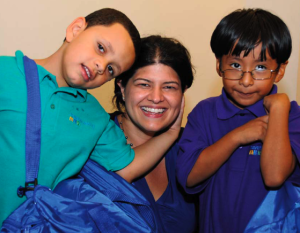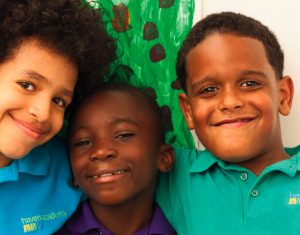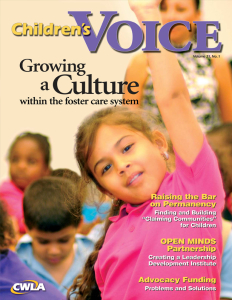Featured Article: Growing a Culture within the Foster Care System
Studies indicate that on average, a child in the foster care system will trail behind his or her peers academically by at least a grade and a half by the fourth grade. Bill Baccaglini, the executive director of the New York Foundling, a CWLA member agency that has provided child welfare services in the New York City since 1869, observed this phenomenon. “That’s nothing but a recipe for a high school drop out,” he says. “You’re not going to stay in school if you trail that far behind.” Determined to develop an innovative way to combat this, Baccaglini devised a plan for an experimental charter school–the South Bronx’s Mott Haven Academy Charter School–that would combine the Foundling’s extensive services with at-risk students in kindergarten through the eighth grade.
Situated in the poorest congressional district in the nation, the model of Haven Academy addressed the additional needs of a vulnerable population by co-locating all of the Foundling’s family services within the building. “The theory was, ‘I can use all of my child welfare services to address the issues that have undermined academic achievement in this population,'” Baccaglini says.
The New York Foundling employs a number of social workers with child welfare expertise at Haven Academy. This way, if a child is having a bad day, counselors are already available. “We’ve also wrapped a ton of social workers around the school, because there are times when what’s going on at home requires that we intervene. At that point, the school reaches out to the child welfare side where we have the case workers who monitor the families,” says Baccaglini. “Then we use the case workers to use the youngster’s school progress as a way to interact with parents when they go on primary visit.” A primary health clinic and a mental health clinic are also located within the building, but first and foremost, Haven Academy is a school. Only when the needs become obvious do the social workers step in.
Founded in 2008, the student population of Haven Academy grows by a grade a year. “Our determination was that the best way to build a charter school was to grow it a grade a year so that a school culture could evolve. That way, we can have older kids there as role models,” Baccaglini says. “We also make sure if you come into kindergarten with us and you have a younger sibling, we’ll guarantee admission to the sibling. This is because we want our education model to take root in the home; we want to engulf families with this approach to education. We want our approach to permeate the household,” he said. In the fall of 2012, Haven Academy was looking forward to the 2012-2013 school year with a student body that would encompass kindergarten through the fifth grade.
Because of the gradeby-grade growth of Haven Academy, school administrators are able to clearly identify what works and revise practices to better reflect that. “In terms of academics, the trailblazing older kids help us identify what subjects are commonly struggled with, so we can revise plans for the younger kids coming in,” says Principal Jessica Nauiokas. The older children are better at problem-solving and have developed leadership skills, making them suitable role models for their younger peers. The grade-by-grade growth also makes individual student growth easier to observe. “I was out during recess, and the third and fourth graders were having fun, playing safe, following the school rules, and being creative in their play,” she says. “Little kids need more structure; there’s more freedom with the older kids.”

Principal Jessica Nauiokas with Haven Academy students. Photo courtesy of Mott Haven Academy Charter
The Foundling is committed to its vision of surrounding children with positive and preventative services so that they may develop emotionally and academically. Mott Haven Academy Charter School is the first school of its kind, and the administrators feel an obligation to contribute to the cumulative knowledge base of child welfare. “We’re absolutely pioneers in the field,” says Nauiokas. “I’m proud of the fact we established a school for kids who need customized learning plans. We’re getting great results and have a stable student body. We’re able to give [students] a place to learn and feel safe.”
Because the Foundling recognizes that the data it collects regarding Haven Academy could help schools with similar goals, it designed the school in a way that makes data collection easy. One-third of each incoming class is comprised of children from foster care, one-third is comprised of children with families who are receiving preventative services from agencies like the Foundling, and kids from the general South Bronx community make up the other third. With a data breakdown like this, perhaps some conclusions will be drawn in the best approaches to educate at-risk youth. “We set it up this way purposefully so we could answer some fundamental questions. Does the model work for all kids? Some kids? Community kids?,” says Baccaglini.
The Foundling does “reverse creaming” when searching for suitable students, by seeking out children who are doing poorly in Bronx public schools. “Our hypothesis is that because we’re a specialized school, and we can distinguish behavioral problems from intellectual challenges, we’ll have a more accurate view of the percentage of kids who need special education. We think what happens in public schools is Johnny comes in, his behavior is off the wall, and it’s misinterpreted as being unable to learn. We understand that behavior is one thing and the capacity to learn is another,” says Baccaglini.
Shiree Cohen, who adopted her son Anthony through foster care, had firsthand experience at how well-suited Haven Academy is to educate children with special needs. “Essentially, Anthony has ADHD and his symptoms exacerbated in kindergarten when he was at another school,” says Cohen. The principal of that school told her that they were unable to manage Anthony’s special needs, but told her about Haven Academy. Determined to get Anthony get into a charter school, Cohen entered a lottery for Haven Academy. “The general education classes in the zoned school had a poor reputation. I worried that Anthony would end up in an overcrowded classroom and get lost academically. He also needed to be in an environment in which his self-esteem would improve.
“The thing that impresses me the most about Haven Academy is the small size of the school. Most of the staff knows the children by their first name, and the staff know a great deal about the students and families. Anthony excels at Haven Academy academically–he loves reading and math. He also loves his teachers. He is in a collaborative team-teaching class which is ideal, because the teachers are able to manage his emotional issues and maintain his selfesteem,” Cohen says.
Haven Academy’s small size creates a feeling of safety and intimacy among the students, who receive ample encouragement and early support for any difficulties they may face. “We spend as much time on social and emotional development as on academic development,” says Nauiokas.
Haven Academy’s curriculum is devised from the common core standards for New York State. “We want our kids to meet or exceed grade level outcomes by the eighth grade exit,” says Nauiokas. Assessments are designed by grade, and in addition to academics, the school also evaluates social and emotional progress–such as dealing with disappointment, learning flexibility– and problem solving skills. Haven Academy measures success by looking at growth and improvement in students’ work. This includes academic skills, creative endeavors, and problem solving. “Our goal is for kids to compete for the best high schools in the city [after eighth grade],” says Nauiokas.
In terms of teaching models, Haven Academy’s teachers specialize in collaborative team teaching, and two teachers are assigned to each classroom. Children with special education needs are placed in the same classes as conventional students. Nauiokas noted the many small-group options that give children the invaluable opportunities to make mistakes and learn from them. “We try to have a creative approach and honor the knowledge the child already has,” says Nauiokas.
To support academic progress, Haven Academy addresses the social needs of the children and families. Several low or no-cost family events are scheduled, which enables most families to attend. Haven Academy also offers afterschool programs from 4 p.m. to 6 p.m., which are located in the building and help kids to further develop the skills they learn at school. Nauiokas cites some of the various clubs, which target areas in which students could improve. “If a child is shy about speaking in public, there’s a ‘feel-good’ club with a counselor who works with them on developing more confidence,” she says. There are clubs that work to build other social skills–a “cool it” club, for example. Afterschool activities also include the “Futures” program, academic support, and creative art enrichment. About 60 percent of the student body is enrolled in afterschool care, free of charge, with help from the Foundling.
The Foundling commits to every child who starts with them. “We believe strongly in having an educational home,” says Baccaglini. But the Foundling also recognizes that children in the foster care system are frequently required to relocate with new families. The goal is for the students at Haven Academy to remain at the school, despite the number of home transitions they have to experience. However, if a child is reassigned to a family that lives far away from the school and will therefore require a long commute to another area, the administrators recognize safety concerns of a young child and may reassess his or her enrollment.
What does Principal Nauiokas recommend to educators in similar fields? “Recognize that child welfare-involved kids need adults to help them in youth through adulthood. Sometimes, this means undoing what was learned early on. Our kids need an encouraging person in their life, and that is what Haven Academy offers,” she says.
Laural Hobbes, a former regular contributor to Children
Other Featured Articles in this Issue
Mott Haven Academy Charter
Growing a culture within the foster care system
Raising the Bar on Permanency:
Finding and Building “Claiming Communities” for Children
Departments
• On the Road with FMC
A Time for Transparency and Ethical Journalism
• Leadership Lens
• Spotlight On
CWLA Leadership Development Institute launches through OPEN MINDS partnership
• National Newswire
The Affordable Care Act, Medicaid, and Child Welfare
• Down to Earth Dad
Advice for Dads…Don’t Give Any!
• Exceptional Children
Raising a Quitter
• One On One
An interview with Mark Hierholzer, former CEO, ChildSavers


